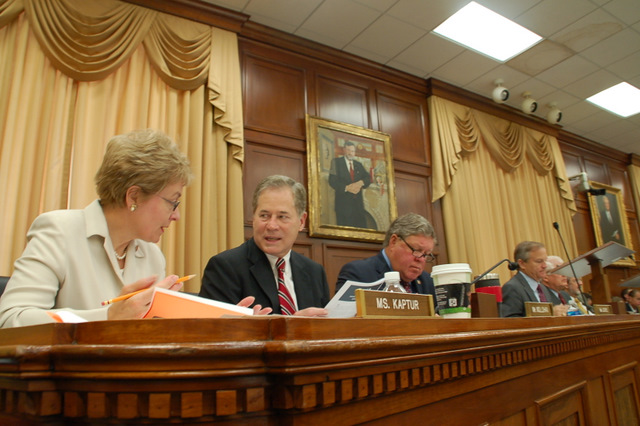 Congresswoman Marcy Kaptur, who represents Northern Ohio's Ninth Congressional District, is currently serving her fifteenth term in the U.S. House of Representatives.
Congresswoman Marcy Kaptur, who represents Northern Ohio's Ninth Congressional District, is currently serving her fifteenth term in the U.S. House of Representatives.
She is the senior-most woman in the U.S. House of Representatives.
Training & Education
Congresswoman Kaptur, of Polish-American heritage with humble, working class roots, mirrors the bootstrap nature of her district. Her family operated a small grocery where her mother worked after serving on the original organizing committee of an auto trade union at the Champion Spark Plug Company.
Congresswoman Kaptur became the first member of her family to attend college, receiving a scholarship for her undergraduate work. Trained as a city and regional planner, she practiced 15 years in Toledo and throughout the country. Appointed as an urban advisor to the Carter White House, she helped maneuver 17 housing and neighborhood revitalization bills through the Congress during those years.
Subsequently, while pursuing a doctorate in urban planning and development finance at the Massachusetts Institute of Technology, the local Democratic Party recruited her to run for the U.S. House seat in 1982. Kaptur had been a well-known party activist and volunteer since age 13. Although she was outspent by a 3-to-1 margin, she parlayed her deep roots in the blue-collar neighborhoods of Toledo and the rural areas of the district to pull the national upset of 1982.
Congress
 Congresswoman Kaptur fought vigorously to win a seat on the House Appropriations Committee . She has risen in seniority and now serves as the senior Democratic woman on the committee.
Congresswoman Kaptur fought vigorously to win a seat on the House Appropriations Committee . She has risen in seniority and now serves as the senior Democratic woman on the committee.
She has secured appointments to three important subcommittees: Defense, Agriculture, the leading industry in her state; and Transportation/Housing and Urban Development (HUD).
Congresswoman Kaptur was also appointed by party leadership to serve on the prestigious House Budget Committee for the 112th Congress.
Kaptur is the first Democratic woman to serve on the Defense subcommittee. During her legislative career, she has also served on the Banking and Veterans Affairs Committees.
Congresswoman Kaptur has focused strong efforts on rebuilding the economic might of her district such as improvements in bridge, road, rail and port facilities, including the I-280 Veterans' Glass City Skyway - the largest bridge project in Ohio's history; expansion of Toledo's Farmers' Market; development of the Maumee River Heritage Corridor between Ohio and Indiana, which includes passage of legislation and funds to acquire the Fallen Timbers battlefield site as a national affiliate of the U.S. Park Service; clean-up of the waterways adjacent to Lake Erie; development of initiatives to enhance the earnings potential of Northwest Ohio crops; shipping of federal cargos on the Great Lakes; acquisition of wildlife refuges and shoreline recreation; and expansion of university-related research.

Kaptur also directed federal support to acquire Quarry Pond as the centerpiece for a new conservation and lands legacy endowment for northwest Ohio. Lucas County-based 180th Tactical Fighter Squadron underwent a F-16 modernization attributable to her efforts. Current and former Defense Department and other private-sector workers who were exposed to and suffer from beryllium were the beneficiaries of a major piece of legislation Kaptur guided to passage.
She was awarded the Veterans of Foreign Wars Americanism Award, in part for introducing the legislation authorizing the National World War II Memorial in Washington in 1987, as well as for her longstanding commitment to America's veterans. She also received the Prisoner of War "Barbed Wire" Award for her commitment to veterans' affairs.

Dedication of the National World War II Memorial on the National Mall in Washington, D.C. on May 29, 2004 culminated a 17-year legislative effort that started with an idea that sprang from the grassroots of her congressional district. In 1986, Roger Durbin, a rural letter carrier from Berkey, Ohio, asked Congresswoman Kaptur at a fish fry at a township hall to explain why there was no memorial to World War II in Washington.
Kaptur helped make Roger Durbin's dream a reality by introducing legislation in Congress to create the memorial. There were stops and starts, but nothing could stop this powerful idea. Today, the World War II Memorial is one of the most popular tourist attractions in our nation's capital and a timeless salute to the men and women of the "Greatest Generation."
Dedicated to the principle that fiscal responsibility begins in "one's own backyard," Congresswoman Kaptur has consistently returned money to the federal Treasury. She refuses to accept Congressional pay raises and donates them to offset the federal deficit and charitable causes in her home community.
International Aid

Awards
Kaptur is a native of Toledo, Ohio, a member of Little Flower Roman Catholic Church, and a graduate of St. Ursula Academy. She earned a Bachelor of Arts in history from the University of Wisconsin (1968) and a master's in urban planning from the University of Michigan. In 1993, Congresswoman Kaptur was awarded an Honorary Doctor of Laws degree by the University of Toledo in recognition of her "effective representation of the community." St. Ursula Academy named Kaptur Alumna of the Year in 1995. She is recipient of the Taubman College Distinguished Alumna award from the University of Michigan, making her the first woman so recognized and the first graduate of the Urban and Regional Planning Program to be so honored.
Kaptur recently received the Director's Award from the Edmund A. Walsh School of Foreign Service at Georgetown University for her commitment to increased understanding and appreciation of the peoples and cultures of Eurasia, Russia and East Europe.
She was named the National Mental Health Association's "Legislator of the Year" for her championing mental health and received the 2002 Ellis Island Medal of Honor.
Kaptur is also the author of a book, Women in Congress: A Twentieth Century Odyssey, that was published by Congressional Quarterly in 1996.
